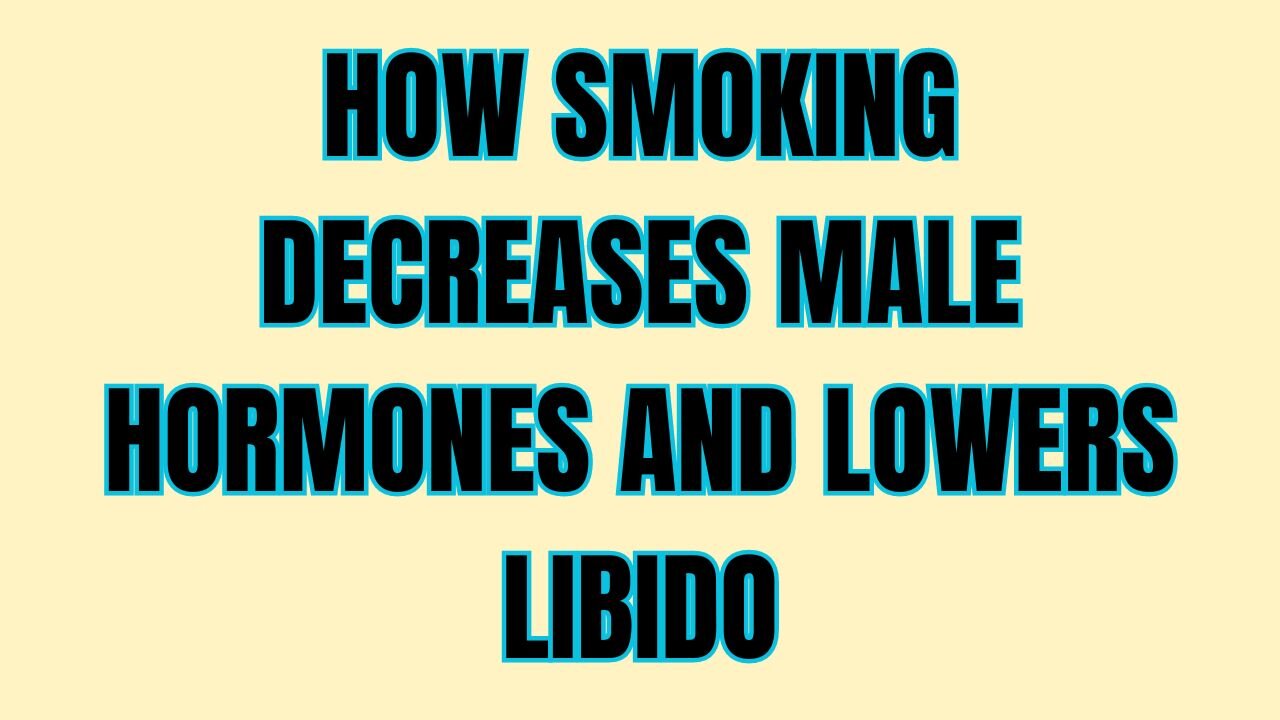Premium Only Content

How Smoking Decreases Male Hormones and Lowers Libido
How Smoking Decreases Male Hormones and Lowers Libido
Smoking is widely known for its detrimental effects on lung health, cardiovascular health, and overall well-being. However, one of the less-discussed yet significant impacts of smoking is its adverse effect on male hormones and libido. Understanding how smoking affects these aspects of male health can provide additional motivation to quit and improve quality of life.
The Mechanisms Behind Hormonal Disruption
Reduction in Testosterone Levels: Testosterone, the primary male sex hormone, plays a crucial role in maintaining libido, muscle mass, bone density, and overall vitality. Research has shown that smoking can lead to a decrease in testosterone levels. This reduction occurs due to the harmful chemicals in tobacco smoke, which can directly damage the Leydig cells in the testes responsible for testosterone production.
Increase in Sex Hormone-Binding Globulin (SHBG): SHBG is a protein that binds to sex hormones, including testosterone, making them inactive. Smokers tend to have higher levels of SHBG, which means that even if testosterone levels are not significantly reduced, more of it is bound and unavailable for use by the body. This results in lower bioavailable testosterone, effectively reducing its action in the body.
Oxidative Stress and Cellular Damage: Smoking generates a large number of free radicals, which can cause oxidative stress and damage to various tissues, including those involved in hormone production. The oxidative stress can impair the function of the testes and other endocrine organs, further reducing hormone levels.
Disruption of the Hypothalamic-Pituitary-Gonadal Axis: This axis is responsible for regulating the production of testosterone and other hormones. Smoking can interfere with this regulatory system, leading to an imbalance in hormone levels. The disruption of signaling pathways can result in decreased production of testosterone and other critical hormones.
The Impact on Libido
Reduced Blood Flow: Nicotine and other chemicals in cigarettes cause blood vessels to constrict, reducing blood flow throughout the body, including to the genital area. Adequate blood flow is essential for achieving and maintaining erections. Reduced blood flow can lead to erectile dysfunction, a condition closely linked to decreased libido.
Impaired Nerve Function: Smoking can damage the nerves involved in sexual arousal and response. This nerve damage can make it more difficult to achieve sexual arousal and can diminish the sensations associated with sexual activity, leading to a lower libido.
Hormonal Imbalances: As discussed, smoking can reduce testosterone levels and increase SHBG, leading to hormonal imbalances that can lower sexual desire. Testosterone is integral to libido, and any significant reduction can directly impact sexual drive.
Psychological Factors: The act of smoking is often associated with stress and anxiety, which can further reduce libido. Additionally, the psychological impact of knowing that smoking negatively affects one's health can lead to a decrease in sexual confidence and desire.
Reversing the Damage
The good news is that quitting smoking can lead to improvements in hormone levels and libido. Studies have shown that within a few weeks of quitting, testosterone levels begin to normalize, and overall hormonal balance improves. Increased blood flow and reduced oxidative stress contribute to better erectile function and sexual health.
Immediate Health Benefits: After quitting, blood pressure and circulation improve, which can lead to better erectile function. These immediate improvements can boost confidence and libido.
Long-Term Hormonal Balance: Over time, the body's endocrine system can recover, leading to more stable and higher levels of testosterone and other hormones. This recovery helps restore normal sexual function and desire.
Psychological Well-being: Quitting smoking also reduces anxiety and stress levels, which can positively affect libido. Improved self-esteem and mental health contribute to a healthier sex drive.
Conclusion
Smoking has a profound negative impact on male hormones and libido. By understanding the mechanisms behind this effect, men can take proactive steps to improve their hormonal health and overall well-being. Quitting smoking is one of the most effective ways to enhance hormone levels, improve sexual health, and boost libido. The benefits of quitting extend far beyond sexual health, contributing to a longer, healthier life.
-
 1:00:32
1:00:32
Man in America
11 hours ago🔴 LIVE: Terror Attacks or False Flags? IT DOESN'T ADD UP!!!
69.2K20 -
 1:02:38
1:02:38
Donald Trump Jr.
13 hours agoNew Year’s Terror, Latest Breaking News with Sebastian Gorka | TRIGGERED Ep.204
194K400 -
 59:59
59:59
The StoneZONE with Roger Stone
8 hours agoAfter Years of Targeting Trump, FBI and DOJ are Unprepared to Stop Terror Attacks | The StoneZONE
65.6K19 -
 1:26:42
1:26:42
Leonardaisfunny
7 hours ago $4.26 earnedH-1b Visas: Infinity Indians
43.1K18 -
 1:08:33
1:08:33
Josh Pate's College Football Show
12 hours ago $2.57 earnedPlayoff Reaction Special: Ohio State Owns Oregon | Texas Survives | UGA vs Notre Dame Takeaways
36.5K6 -
 58:04
58:04
Kimberly Guilfoyle
11 hours agoFBI's Terror Response Failures, Live with Steve Friend & Kyle Seraphin | Ep. 185
113K45 -
 2:15:01
2:15:01
WeAreChange
12 hours agoMassive Developments In Vegas Investigation! UNREAL DETONATION, Shocking Details Emerge!
118K89 -
 54:02
54:02
LFA TV
19 hours ago2025 Is Off to a Violent Start | TRUMPET DAILY 1.2.25 7pm
50.3K9 -
 59:27
59:27
theDaily302
18 hours agoThe Daily 302- JJ Carrell
44.2K5 -
 2:57
2:57
EvenOut
2 days ago $1.90 earnedTHE TELEPORTING PORTA POTTY TWIN RPANK!
40.4K3